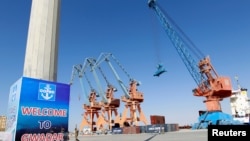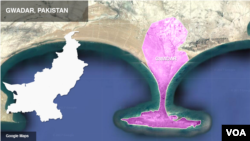Pakistan is struggling to attract commercial activity to a Chinese-funded deep-sea port in the southwest that experts say is hampered by local insecurity, a lack of basic services and the absence of plans to make the port prosper.
A press release issued Wednesday after a meeting chaired by Pakistani Minister for Planning and Development Ahsan Iqbal indicated that authorities do not have a plan to attract trade to the port, nearly a decade after the first container ships traveled through it in 2016.
“The minister noted the lack of commercial analysis and a comprehensive operational plan for Gwadar Port, calling for immediate efforts to unlock its potential,” the statement said.
Iqbal has ordered a plan to be drawn up within six months to generate trade traffic, according to the statement.
Constructed in 2007 at a cost of nearly $250 million and operated by the China Overseas Ports Holding Company since 2013, Gwadar port is situated in the warm waters of the Arabian Sea in Pakistan’s Balochistan province.
Although built before the 2015 launch of the roughly $60 billion China-Pakistan Economic Corridor, the port is billed as the “crown jewel” of the energy, infrastructure and investment project launched as part of Beijing’s Belt and Road Initiative.
Despite nearly a billion dollars of additional infrastructure development in and around Gwadar city, a report by Pakistan’s Ministry of Maritime Affairs has noted that during the fiscal year 2022-23, Gwadar, the smallest of the country’s three ports, handled less than 1% of Pakistan’s seaborne trade at its three berths.
“All this is symptomatic of absence of long-term planning in Pakistan's governance system,” said Muhammad Faisal, an expert in Pakistan’s foreign policy at the Sydney-based University of Technology.
“From the beginning, Gwadar was more of a ‘geopolitical’ venture than a pure commercial case,” Faisal said in a written statement.
In a bid to ramp up shipping activity in Gwadar, Prime Minister Shahbaz Sharif told a cabinet meeting Tuesday that 60% of public sector imports and exports should pass through the port. This came after Sharif ordered at least 50% of public cargo to go through the port in a Cabinet meeting last August.
Former Prime Minister Shahid Khaqan Abbasi told VOA that the port lacks the infrastructure and manpower to handle massive cargo.
“Unless you spend another 3 billion to 4 billion dollars there and make a world-class port, you really can’t call it a port,” Abbasi said, criticizing what he called the Sharif government’s unrealistic approach.
According to reports, the Chinese firm operating the Gwadar port plans to build a total of 100 berths by 2045.
Pakistan’s largest airport by area, which was built near Gwardar port, also remains largely unused. Aviation website Skyscanner shows three weekly domestic flights to Karachi and one international flight to Oman from the massive new facility.
Constructed with a $230 million Chinese grant, the opening of New Gwadar International Airport suffered several delays prior to its soft launch last month.
Wednesday’s statement from the planning ministry said Iqbal directed the preparation of marketing templates and packages showcasing Gwadar’s cost-effective trade routes and potential incentives for international businesses.
Insecurity, lack of services a hurdle
Abbasi, who is also an aviation expert, told VOA that while the new Gwadar airport is a necessary accompaniment to the deep-sea port in the long term, the lack of basic facilities such as water, electricity and security in the city make it an unattractive destination for airlines.
“Airlines have a basic requirement that there must be passengers. No passenger wants to come to Gwadar or leave from Gwadar,” Abbasi said.
Balochistan province, home to Gwadar, has been in the throes of a separatist insurgency for two decades, and violence has escalated in recent months. At least six people, mostly security personnel, and eight militants were killed recently as Pakistani forces thwarted an attack on the Gwadar Port Authority complex near the port.
The port gives China a shorter route for trade with the Middle East and Central Asia. Despite Pakistan’s failure to market Gwadar port and airport to international businesses, Sydney-based expert Faisal said the project may not become a liability like Sri Lanka’s Hambantota port, which Beijing took control of in 2017 after Colombo failed to pay off debt linked with it.
“Since Pakistan fundamentally viewed Gwadar port in ‘geostrategic’ terms and contrasts it with India's cooperation with Iran in neighboring Chahbahar port, Gwadar will remain useful for Pakistan,” Faisal told VOA.
Mustafa Hyder Sayed, executive director of the Islamabad-based Pakistan-China Institute, said the slow pace of business in Gwadar is not a problem for bilateral ties.
“State-to-state relations are deep-rooted in long-term strategic interests and not any [one] event; not any project or single instance can harm any state-to-state relations,” Sayed told VOA.







